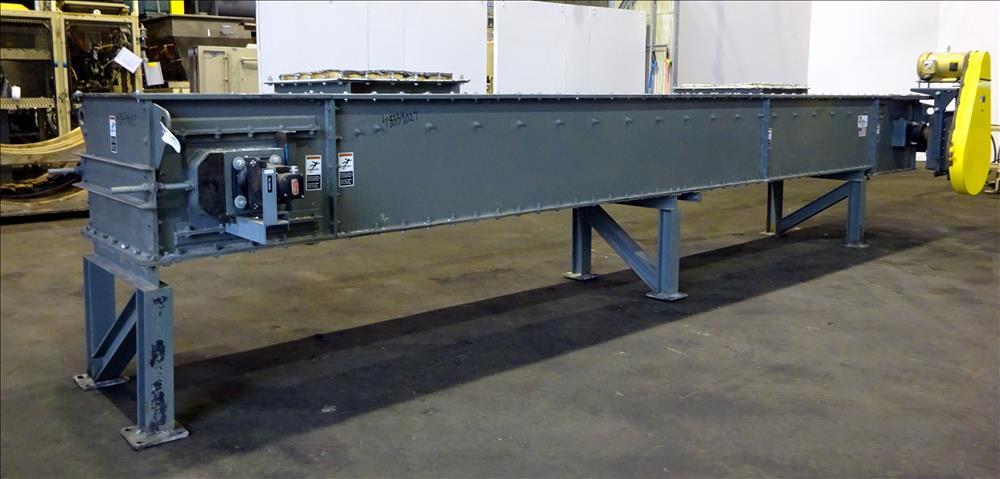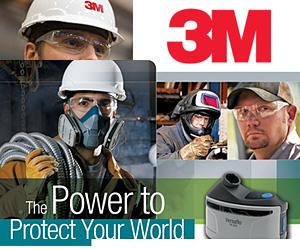Drag chain conveyors are essential components of material handling systems, enabling the efficient and reliable transportation of bulk materials. In this comprehensive guide, we will explore the inner workings of drag chain conveyors, discuss their advantages, examine their key applications across various industries, delve into design considerations, offer maintenance best practices, and highlight future trends. Additionally, we will showcase the expertise of KWS® Manufacturing in designing and manufacturing dependable drag chain conveyors, providing valuable insights into their innovative solutions.
What are Drag Chain Conveyors?
Drag chain conveyors consist of several components that work together to move materials along a designated path. The key components include chains, flights, drive units, and troughs. Chains with attached flights are pulled along the conveyor, dragging the materials with them. Understanding these components and their roles is crucial to comprehending how drag chain conveyors operate effectively.
Advantages and Key Features of Drag Chain Conveyors
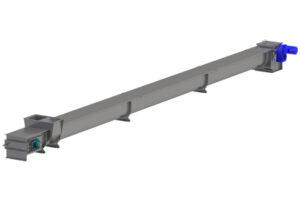 Drag chain conveyors offer distinct advantages that make them preferred choices over other conveyor systems. Their ability to handle heavy loads, operate reliably in harsh environments, and accommodate materials with varying particle sizes and characteristics are significant benefits. Additionally, the durability, flexibility, and adaptability of drag chain conveyors contribute to their wide range of applications.
Drag chain conveyors offer distinct advantages that make them preferred choices over other conveyor systems. Their ability to handle heavy loads, operate reliably in harsh environments, and accommodate materials with varying particle sizes and characteristics are significant benefits. Additionally, the durability, flexibility, and adaptability of drag chain conveyors contribute to their wide range of applications.
When it comes to designing and manufacturing these top-notch conveyors, KWS truly stands out. With their expertise, they create conveyor systems that can handle it all – from hefty loads to demanding conditions. Their commitment to delivering reliable solutions that perform exceptionally is evident in their craftsmanship.
Key Applications of Drag Chain Conveyors
Drag chain conveyors work well in extensive applications in diverse industries due to their versatility and efficiency. Let’s explore some of the key industries that commonly utilize drag chain conveyors:
- Mining and Aggregates: Drag chain conveyors efficiently transport bulk materials, such as ores, coal, and aggregates, across mining operations, including extraction, processing, and storage.
- Agriculture: In the agricultural sector, drag chain conveyors handle grain, feed, and other agricultural products during various stages of production, including harvesting, processing, and distribution.
- Waste Management and Recycling: Drag chain conveyors play a crucial role in waste management facilities, facilitating the movement of recyclables, municipal solid waste, and industrial waste for sorting, processing, and disposal.
- Automotive and Manufacturing Processes: Drag chain conveyors are utilized in automotive and manufacturing plants to transport components, raw materials, and finished products along assembly lines, ensuring smooth production flows.
- Power Generation and Utilities: Drag chain conveyors efficiently handle biomass, ash, and other materials in power plants, enabling the generation of electricity and supporting utilities’ operational processes.
Design Considerations for Drag Chain Conveyors
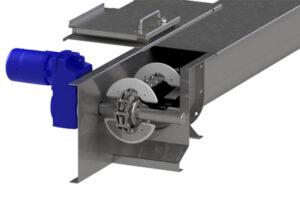

- Material Characteristics: Understanding the properties of the materials being conveyed, including size, shape, density, and flow characteristics, is vital for selecting the appropriate drag chain conveyor design.
- Capacity Requirements: Determining the required conveyor capacity ensures that the system can handle the desired throughput without overloading or causing bottlenecks.
- Layout Constraints: Considering the available space, layout limitations, and potential obstacles helps in designing a drag chain conveyor system that fits seamlessly into the facility’s infrastructure.
KWS possesses extensive expertise in customizing drag chain conveyors to meet specific application needs, taking these design considerations into account. KWS’ drag chain conveyors are customizable with several features, including a wide range of materials (carbon steel, stainless steel, and abrasion-resistant alloys), drop-forged chain for increased equipment life, easily replaceable wear liners, and high torque drive units.
Maintenance and Troubleshooting of Drag Chain Conveyors
Proper maintenance is essential to ensure the longevity and reliability of drag chain conveyors. Implementing routine maintenance practices and adhering to inspection schedules can prevent unexpected breakdowns and minimize downtime. Key maintenance practices include:
- Chain Tensioning: Regularly check and adjust chain tension to maintain optimal performance and prevent excessive wear.
- Lubrication: Proper lubrication of chains, bearings, and other moving components ensures smooth operation and reduces friction.
- Component Inspection: Regularly inspect flights, sprockets, and other conveyor components to identify signs of wear, damage, or misalignment.
In the event of troubleshooting issues, it is essential to diagnose the problem accurately and implement appropriate solutions. KWS emphasizes reliability and offers support to maintain optimal drag chain conveyor performance.
Automation and Innovations with Drag Chain Conveyors
The field of drag chain conveyors continues to evolve with advancements in technology and industry demands. Here are some innovations to watch for:
- Automation Integration: Integration of automation technologies, such as sensors and programmable logic controllers (PLCs), allows for enhanced control, monitoring, and optimization of drag chain conveyor systems.
- Advanced Monitoring Systems: Implementation of real-time monitoring systems enables proactive maintenance, early fault detection, and performance optimization, contributing to increased operational efficiency.
- Energy Efficiency: Advancements in motor technology and energy-efficient components contribute to reducing energy consumption and environmental impact.
KWS: A Leader in Quality Manufacturing and Versatile Design
As an ISO 9001:2015 certified manufacturer, KWS ensures that every drag chain conveyor they produce adheres to rigorous quality standards. Their team comprises highly skilled craftsmen who bring their expertise to every stage of the manufacturing process. With their wealth of experience in designing and manufacturing dependable drag chain conveyors, KWS also offers modular construction for these solutions. This modular approach provides versatility and adaptability, enabling the drag chain conveyors to meet the unique requirements of various applications.
IBT: Your Trusted Partner in Material Handling Solutions
Partnering with IBT Industrial Solutions for your material handling needs guarantees access to our team of dedicated conveying systems experts. Whether it’s conducting an initial site survey, conceptualizing and designing solutions, or providing implementation and ongoing technical support, our experts are committed to delivering accuracy, functionality, and a significant return on investment for your operations. Contact our team today at 913-677-3151 or request a quote to take your conveying systems to the next level.
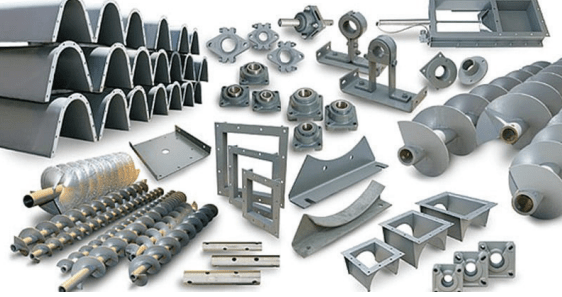

Shop All of Our Online Conveyor Components
Check out ShopIBT.com to find the right conveying products for your needs!

